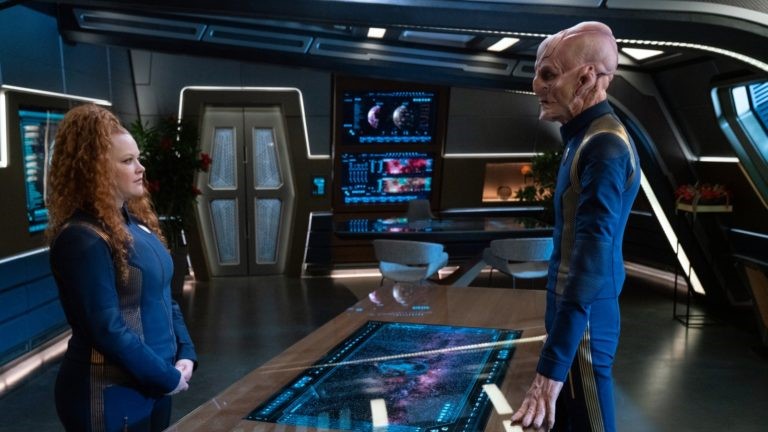What to Watch Verdict
“Unification III” might be the most quintessentially 'Star Trek' episode that Discovery has ever produced.
Pros
- +
🖖🏻That actually pulled off a great sequel to one of The Next Generations' best two-parters.
- +
🖖🏻Michael demonstrates some incredible character growth.
- +
They actually found a way to make Michael's mom interesting!
Cons
- -
🖖🏻As much as I like Tilly's B-plot, I wish it didn't distract from the overall thrust of the episode.
This article contains spoilers for Star Trek: Discovery.
Check out our review of last week's episode here.
“Unification” and “Unification II” are some of the most beloved episodes of The Next Generation for a reason, bringing Leonard Nimoy’s Spock back in an epic bid to redefine how the lines of good and evil are drawn amongst the Vulcans and Romulans, two of the franchise’s most iconic and diametrically opposed races. The revealed shared history of their species was a game-changer in Star Trek lore, and those episodes are remembered as some of the most philosophically rich in the show’s run. That’s why I don’t take it lightly in declaring that Star Trek: Discovery’s ambition in revisiting that conflict in “Unification III” is a massive success, threading the needle to make a faithful homage while avoiding gratuitous pandering, remaining true to what makes Discovery unique while upholding its place in the broader Trek mythos.
The revelation that Spock’s dream of reuniting Vulcan and Romulan cultures has come true is exactly the kind of world-building that makes Discovery now feel like a natural continuation of previous Treks instead of a series of knowing prequelized nods to known characters. The fact that the now-renamed Vulcan-Romulan homeworld Ni’Var is no longer a member of the Federation is devastating in equal measure, a reflection that the Federation’s utopian ideals are potentially neglectful of the individual needs of its members. The titular unification is no longer bridging the gap between centuries of hostility between sibling cultures but now reflects that united culture feeling betrayed by the institution that enabled their unity, as the Vulcans and Romulans refuse to give up data that could pinpoint the source of The Burn because they believe the Federation forced them to cause it. That is a compelling conflict, and one has to applaud this show’s faith in itself to allow it to primarily play out in a formalized debate in a single ritual courtroom setting.
But the title works on another level as well, as this is also an episode for Michael (Sonequa Martin-Green) to come to grips with her role re-entering Starfleet. After her rogue activities and subsequent demotion, the only reason she is sent as the Federation’s ambassador is because of her clout as Ambassador Spock’s sister, and in light of that demotion, we come to realize that Michael herself doesn’t know how she fits into the scheme of the Federation. She’s obsessed with finding the source of The Burn, not only because it has the potential to reunite the Federation, but because she thinks it can give her meaning within the Federation again after having spent a year separated from the Discovery and its crew. This level of internal conflict could have been made more explicit prior to this episode, especially with how much her life with Book (David Ajala) in that intervening year redefined her self-perception, but it makes for an especially meaty piece of personal drama in an episode that could have coasted on being a sequel to a fondly remembered two-parter.
This episode even managed to reintroduce Michael’s birth mother, Gabrielle (Sonja Sohn), in a satisfying context. With all the Red Angel nonsense of last season nullified but still leaving Gabrielle’s whereabouts in this new future as a loose end, it’s compelling to find her as a member of the Romulan Qowat Milat order, providing absolute candor as Michael’s advocate while acting as an empathetic window into Michael’s state of mind. In this we find yet another level of unification, a merging of Discovery’s least successful narrative choices with the new tone and philosophy of the series, providing rewarding continuity without being constrained by convoluted baggage. Gabrielle is now a mentor figure, free to reappear as necessary and to be fully realized as a character, no longer merely a mystery to be agonized over for a whole season.
Also compelling, if somewhat out of place in this episode, is Saru’s (Doug Jones) promotion of Tilly (Mary Wiseman) to acting first officer. Her doubt at her ability to lead is understandable, as is Saru’s confidence that she’s the right person for the job, and it only makes sense that the writers see the potential for interesting drama with Saru and Tilly as unconventional leaders of circumstance. Stamets (Anthony Rapp) rallying the crew to convince Tilly to accept the position was a nice sentimental touch, and overall it’s an intriguing shake-up of the status quo that also feels like a natural progression for these characters.
“Unification III” might be the most quintessentially Star Trek episode that Discovery has ever produced. It’s such a nuanced combination of the legacy that preceded it and new ideas for the future. It’s a smartly written, multi-layered conflict that has the absolute confidence in itself to play out exclusively in heated dialogue. It bridges the emotional gap between the show’s protagonist and the institution she feels distanced from, the political gap between a united people and the Federation that they feel betrayed them, and the spiritual gap between Discovery’s faults and its desire to improve. It does this all with its heart on its sleeve and an eye toward being the best possible version of itself. That’s the kind of episode that deserves to carry on the title of “Unification.”
The latest updates, reviews and unmissable series to watch and more!
Star Trek: Discovery is available to stream on Paramount Plus.
Leigh Monson has been a professional film critic and writer for six years, with bylines at Birth.Movies.Death., SlashFilm and Polygon. Attorney by day, cinephile by night and delicious snack by mid-afternoon, Leigh loves queer cinema and deconstructing genre tropes. If you like insights into recent films and love stupid puns, you can follow them on Twitter.


